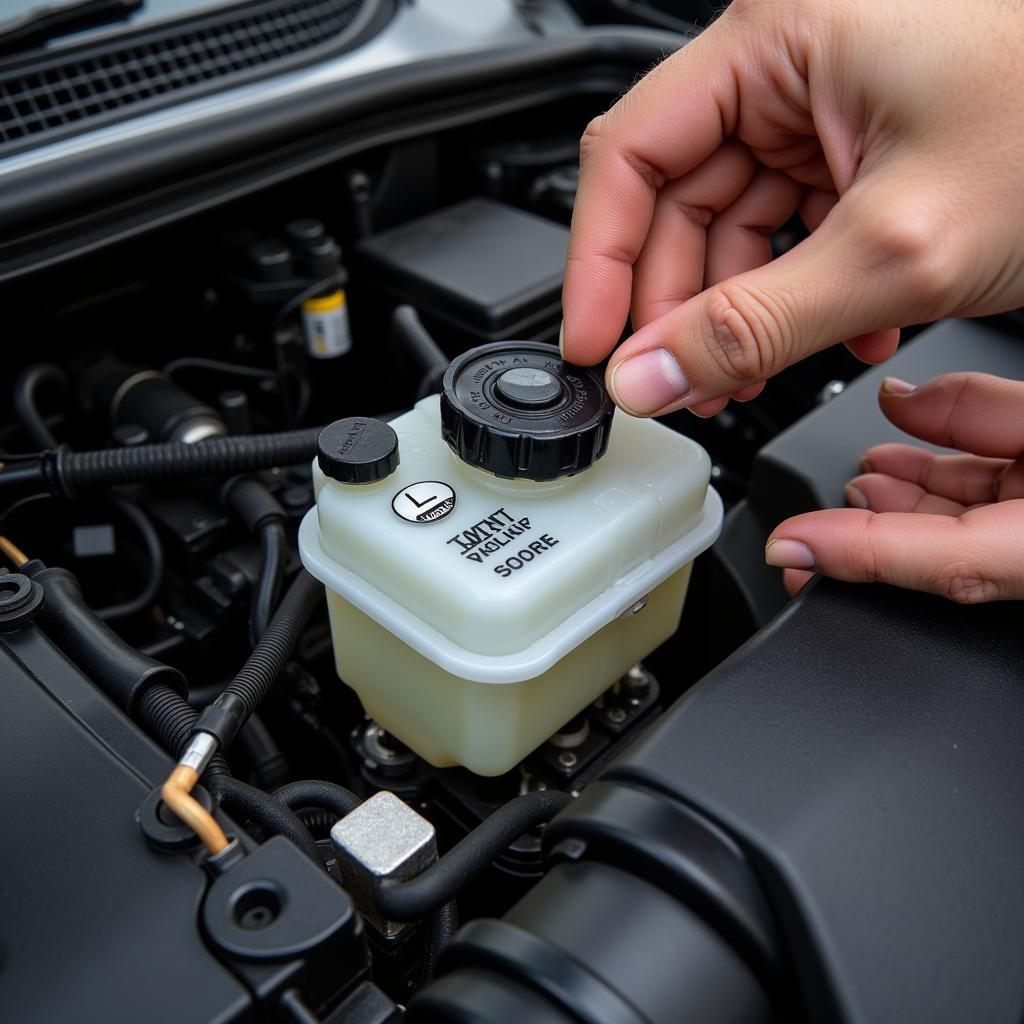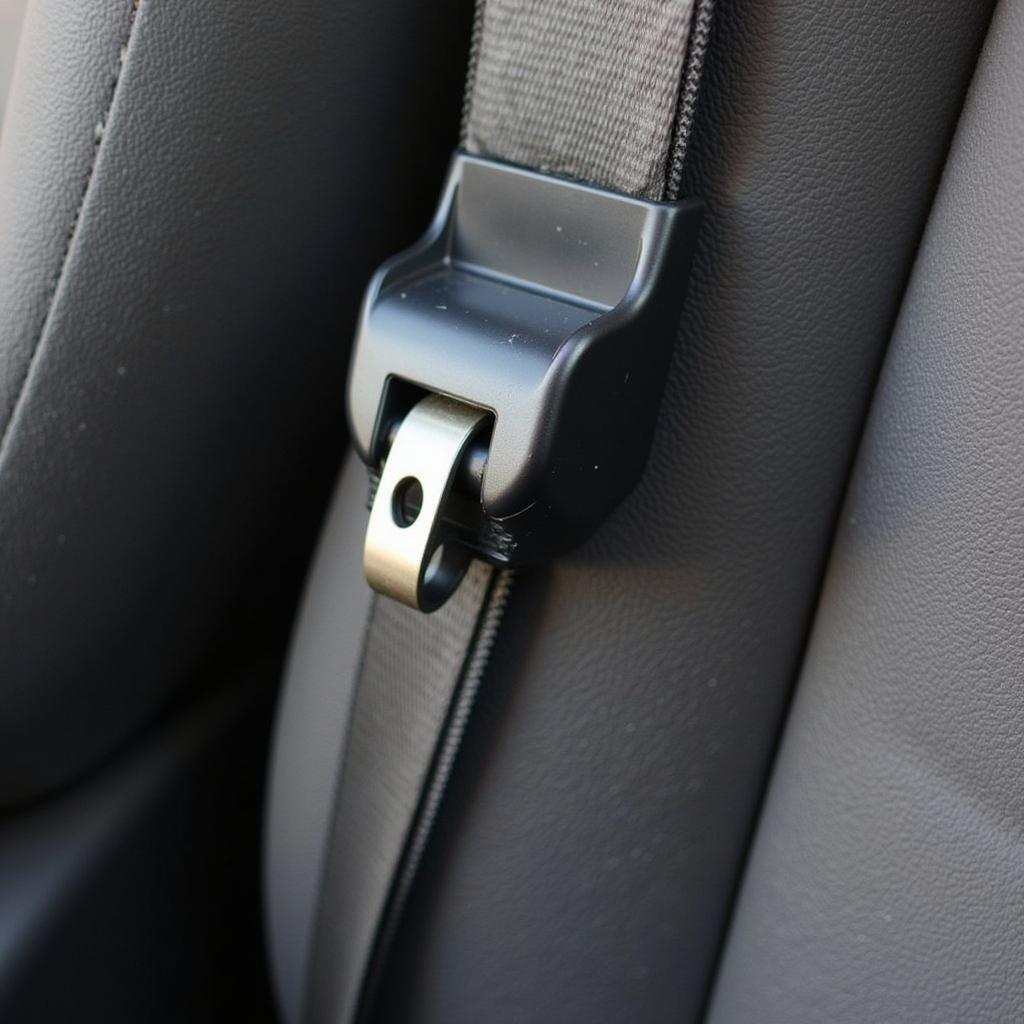The dreaded brake warning light on your BMW dashboard can be a nerve-wracking experience. It’s a stark reminder that a system critical to your safety might be compromised. But before you panic, understand that this warning light can signal several issues, some minor and some requiring immediate attention. This comprehensive guide will walk you through the common causes, troubleshooting steps, and possible solutions when your BMW brake warning light is on.
Understanding Your BMW Brake Warning Light
The brake warning light on your BMW dashboard typically appears as a red circle with an exclamation mark (!) or the word “BRAKE” in the center. In some models, it might be accompanied by a chime or message on the iDrive display.
This warning light is designed to alert you of potential issues within the braking system, which can range from low brake fluid to more serious problems like a malfunctioning ABS system.
Common Reasons Your BMW Brake Warning Light Is On
Here are some of the most common reasons your BMW brake warning light might be illuminated:
- Low Brake Fluid: This is the most common reason for the brake warning light to activate. As brake pads wear down, the brake fluid level in the reservoir naturally decreases. A leak in the brake lines can also cause a rapid drop in brake fluid level.
- Worn Brake Pads: Your BMW is equipped with brake pad wear sensors. When the brake pads wear down to a certain thickness, these sensors trigger the brake warning light, signaling it’s time for a replacement.
- Faulty Brake Pad Sensor: Sometimes, the brake pad wear sensors themselves can malfunction, sending a false signal even if the brake pads are still in good condition.
- ABS Issue: If there’s a problem with your Anti-lock Braking System (ABS), such as a malfunctioning sensor or control module, the brake warning light might come on.
- Parking Brake Engaged: It might seem obvious, but sometimes the simplest explanation is the right one. The brake warning light will stay on if your parking brake is not fully released.
- Brake Light Bulb Out: In some BMW models, a faulty brake light bulb can trigger the brake warning light on the dashboard.
What to Do When Your BMW Brake Warning Light Comes On
If your BMW brake warning light comes on, it’s crucial to address the issue promptly. Here’s a step-by-step guide to help you troubleshoot the problem:
- Safety First: Find a safe place to pull over as soon as possible. Avoid sudden braking.
- Check Your Parking Brake: Ensure your parking brake is fully disengaged.
- Check Your Brake Fluid: Carefully open the brake fluid reservoir and check the fluid level. If it’s below the minimum mark, add the correct type of DOT 4 brake fluid. However, if you need to add brake fluid frequently, it indicates a leak that needs immediate professional attention.
- Inspect Your Brake Lights: Check if all your brake lights are working correctly. Replace any burnt-out bulbs.
- Contact a Qualified Mechanic: If the brake warning light persists or you suspect a more serious issue like a brake fluid leak, worn brake pads, or an ABS problem, it’s crucial to have your BMW inspected by a qualified mechanic immediately.
 Checking BMW Brake Fluid Level
Checking BMW Brake Fluid Level
Can I Reset the Brake Warning Light Myself?
While you might be tempted to reset the brake warning light yourself, it’s generally not recommended unless you’re confident in identifying and resolving the underlying issue. In most cases, resetting the light without fixing the problem will only lead to more significant issues and potentially dangerous driving conditions.
Some BMW models allow for resetting service lights through the iDrive system. However, these resets are generally for routine maintenance reminders and not for critical warning lights like the brake warning light.
How Much Does It Cost to Fix a BMW Brake Warning Light Issue?
The cost of diagnosing and repairing a brake warning light issue in your BMW can vary greatly depending on the underlying problem.
- Low brake fluid or faulty brake light bulb: These are usually simple fixes costing around $50-$100.
- Worn brake pads: Replacing brake pads can range from $150 to $500 per axle, depending on the type of brake pads used.
- Brake pad sensor replacement: This typically costs around $50-$150 per sensor, plus labor.
- ABS issues: Repairs related to the ABS system can be more expensive, potentially costing several hundred dollars or more, depending on the specific component that needs attention.
Preventative Maintenance for Your BMW Brakes
Regular brake system maintenance is crucial for your safety and can help prevent costly repairs down the road. Here are some preventative measures:
- Regular Brake Fluid Flush: BMW recommends flushing your brake fluid every 2 years or 24,000 miles to ensure optimal braking performance.
- Brake Inspections: Have your brakes inspected by a qualified mechanic annually or every 15,000-20,000 miles, especially if you frequently drive in heavy traffic or mountainous terrain.
- Quality Brake Pads: Use high-quality brake pads that are compatible with your BMW model.
BMW Brake Warning Light FAQs
Q: Is it safe to drive with the brake warning light on?
A: No, it is not safe to drive with the brake warning light on. This light indicates a potential issue with your braking system that could compromise your ability to stop safely.
Q: Can a bad battery cause the BMW brake warning light to come on?
A: While a severely depleted battery can cause various electrical issues in your BMW, it’s unlikely to directly trigger the brake warning light.
Q: How long can I drive with low brake fluid?
A: It’s not recommended to drive at all with low brake fluid. If the fluid level is below the minimum mark, have it topped up or inspected for leaks immediately.
Q: Do I need to replace all brake pads at the same time?
A: It’s generally recommended to replace brake pads in pairs (both front or both rear) to ensure even braking performance. However, your mechanic can assess the wear and advise on the best course of action.
Q: How often should I replace my BMW brake rotors?
A: Brake rotors typically last longer than brake pads. A general rule of thumb is to replace rotors every second or third brake pad replacement.
Q: Can I use any brake fluid in my BMW?
A: No, it’s crucial to use DOT 4 brake fluid, which is the type specified for most BMW models. Using the incorrect type of brake fluid can damage your brake system.
Take Control of Your BMW’s Braking System
Remember, your BMW brake warning light is a crucial safety feature. By understanding what triggers this warning light and taking prompt action, you can ensure your safety and address potential issues before they escalate into costly repairs. If you’re unsure about any aspect of your BMW’s braking system, don’t hesitate to consult a qualified BMW mechanic for expert diagnosis and repair.

